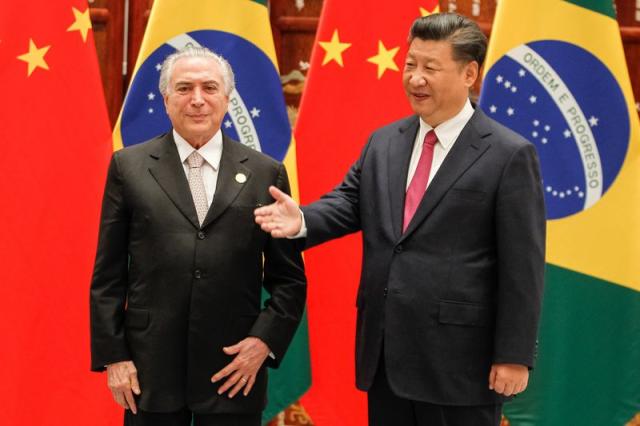
Brazil’s President Michel Temer and China’s President Xi Jinping are shown at an event in Beijing in September. The two countries are working to strengthen partnerships in the oil and gas sector. (Source: Agencia Brasil)
RIO DE JANEIRO—Traditionally business relations between Brazil and China have been based predominantly on trade. The South American country is an important seller of natural resources such as iron ore and soybeans to China. On the other hand, Brazil imports many manufactured goods from the Asian country.
Over the past 10 years, the trade balance between these two countries increased, and in 2016, China registered a trade deficit of $11.8 billion, an increase of 114% compared to the previous year.
Both countries face the challenge of reforming policies, aiming to boost their economies. Brazil dove into a severe economic recession, while China’s economy keeps growing, though at a slower pace. China and Brazil are designing strategies around mutual interests, and one of these strategies is to attract more Chinese investments to Brazil.
In 2016 China invested $7.18 billion, nearly 80% more than the U.S. invested, in Brazil. The amount of China’s investment is expected to increase this year. From January to October 2017, China invested roughly $10 billion in several sectors, including infrastructure, logistics and energy.
Although China is looking for opportunities in a number of areas, the oil and gas sector has a special role among the sectors receiving investment. In fact, this trend has already begun. Two Chinese companies—CNPC (10%)and CNOOC (10%)—are members of the consortium created to carry out E&P activities in Libra, a giant oil field located in Brazil’s southeastern coast with estimated oil reserves of about 12 billion barrels. The other consortium members are Petrobras (40%), Total (20%) and Royal Dutch Shell (20%). The field was acquired in 2013 for $15 billion in signing bonus paid by consortium members according to their respective participation percentages.
And recently, during the 14th licensing round, CNOOC acquired 100% of Block ES-M-592 in the Espírito Santo Basin and teamed with Shell during the third production-sharing bidding round to acquire the Alto de Cabo Frio Oeste presalt field in the Campos Basin. In addition, China National Oil & Gas Exploration & Development Corp., a newcomer, acquired the Peroba presalt field as part of a consortium that includes Petrobras and BP.
More Oil, Gas Investments
In December 2016 Petrobras was paid $5 billion as a result of the financing contract signed with China’s Development Bank (CDB). The financing contract will be effective for 10 years. Petrobras has also signed commercial contracts with China’s National United Oil Corp., China Zhenhua Oil Co. Ltd. and ChemChina Petrochemical Co. Ltd. Together the three contracts will supply 100,000 barrels of oil per day, per market conditions for 10 years.
In September, this financing contract was reinforced through establishment of a strategic agreement with CDB called a “wide-ranging strategic cooperation agreement,” signed during a visit by Brazilian President Michel Temer. Such a move could mark a new phase for Brazilian oil sector activities
According to Anderson Dutra, an oil and gas partner for KPMG Consulting, cooperation such as the one between Petrobras and the Chinese bank will cover the financing and leasing of oil platforms and other equipment needed for oil E&P and joint investments in exploration and refining.
“Brazil is not only important to secure oil for the Chinese. The Brazilian oil market can also contribute to establish contracts with Chinese shipbuilding industry and subsea manufacturers, mainly because Brazil has recently implemented reforms included cuts to local content requirements,” Dutra said.
While OPEC members are considering further oil output cuts, Brazil—which current oil output is about 2.7 million barrels of equivalent oil per day—has announced that it wants to double its oil production by 2027. This strategy helps meet the needs of China’s Strategic Petroleum Reserve, which Beijing has been growing to cushion the world’s second-largest economy from future energy shocks.
China, the world’s number one oil importer, bought roughly 8 million barrels of oil per day, securing resources from oil fields around the world. Brazil’s giant presalt oil fields, such as Libra, plays an important role in that process.
Recommended Reading
Financiers: Family Offices Worldwide are Queuing to Invest in E&P
2024-10-11 - U.S. family offices have stepped in quickly to fill the void left by other investors while family desks abroad have been slow to move but they’re watching closely, financiers say.
The Karl Rove Oil Executive Poll Result: The Industry Is Not Happy
2024-10-03 - A show of no hands revealed more than 400 attendees at Hart Energy’s Energy Capital Conference are not happy with U.S. politics today—and have no confidence it will be better after Nov. 5.
Comments
Add new comment
This conversation is moderated according to Hart Energy community rules. Please read the rules before joining the discussion. If you’re experiencing any technical problems, please contact our customer care team.



